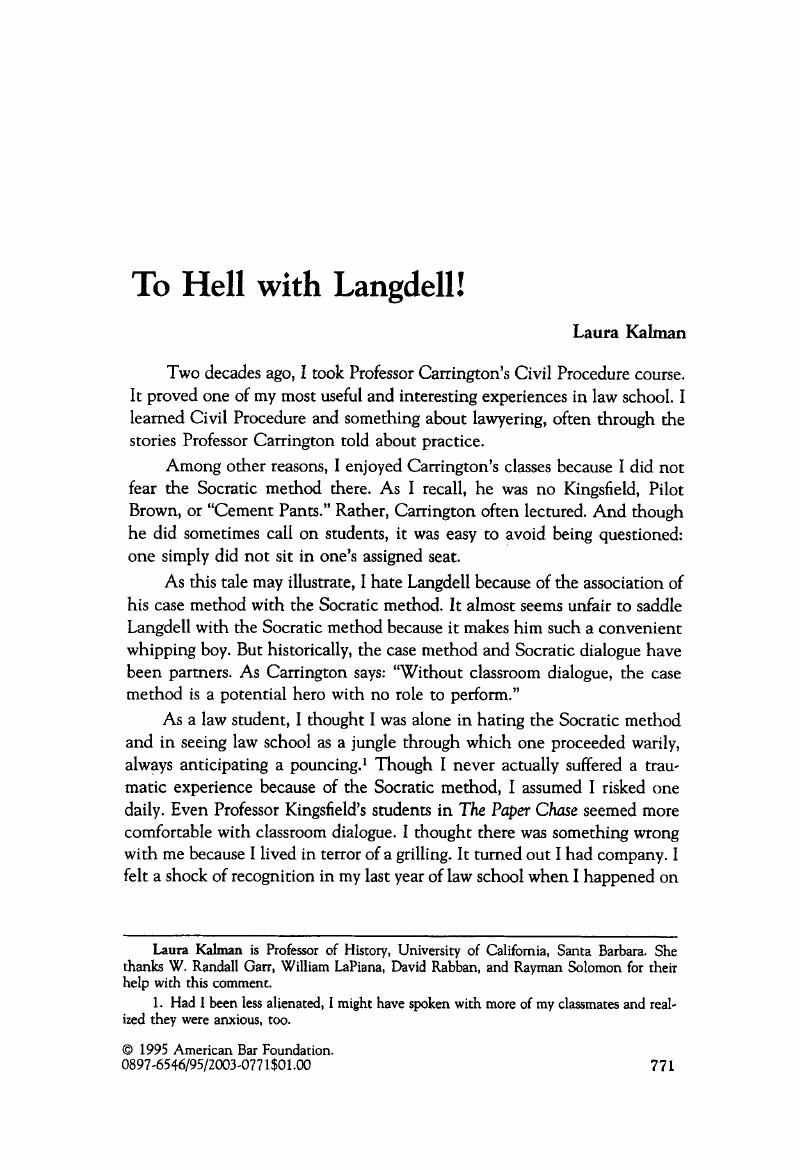No CrossRef data available.
Article contents
To Hell with Langdell!
Published online by Cambridge University Press: 27 December 2018
Abstract

- Type
- Article Commentary
- Information
- Copyright
- Copyright © American Bar Foundation, 1995
References
1 Had I been less alienated, I might have spoken with more of my classmates and realized they were anxious, too.Google Scholar
2 See also Lani Guinier, Michelle Fine, & Jane Balin, with Ann Bartow & Deborah Lee Stachel, “Becoming Gentlemen: Women's Experiences at One Ivy League JAW School,” 143 U. Po. L. Rev. 1, 3-5, 14, 45-47, 59, 65, 98-99 (1994).Google Scholar
3 James Brown, “Honing the Legal Mind: The Classroom Experience,” in Michael Swygert & Robert Batey, eds., Maximizing the Law School Experience: A Collection of Essays 95, 109 (St. Petersburg, Fla.: Stetson University College of Law, 1983).Google Scholar
4 In this perception, Professor Carrington is not alone. See, e.g., Paul Brest, “Plus Ca Change,” 91 Mich. L. Rev. 1945, I948 (1993) (“The terrorist version of the Socratic method has almost disappeared, and it has been replaced by a mixture of lecture, asking questions of volunteers, and responding to questions from the class at large. In my view, we have moved too far away from the Socratic method, which can be intellectually challenging without being cruel-we have thrown the etching out with the acid”); and Martin Louis's lament in Bumele Powell, “A Defense of the Socratic Method: An Interview with Martin B. Louis (1934-94),” 73 N.C.L. Rev. 957, 967 (1995): “It is clear to me that the Socratic method is dying. I think it is dying because an increasing number of young law professors are playing it safe and because we've given much more power to the students to express their unhappiness with the Socratic method.”Google Scholar
5 Lee Bollinger, “The Mind in the Major American Law School,” 91 Mich. L. Rev. 2167, 2173 (1993): “[The basic courses within the first year of law school and the so-called core courses of the second and third years continue, in my judgment, still to be organized around the casebook method, which relies on the appellate court opinion as the principal focus of instruction. It is as if law schools are stuck between the Langdellian revolution of the late nineteenth century and the interdisciplinary revolution of the late twentieth century.”Google Scholar
6 See Harry Edwards, “The Growing Disjunction between Legal Education and the Legal Profession: A Postscript,” 91 Mich. L. Rev. 2191, 2197 (1993): “Most lawyers rarely appear in court, and we should not design the entire law school curriculum as if the opposite were true.”CrossRefGoogle Scholar
7 Of course, the call to integrate legal education with the social sciences and, more recently, the humanities, is almost but not quite as old as university legal education itself. See Laura Kalman, Legal Re&m at Yale, 1927-1960 (Chapel Hill: University of North Carolina Press, 1986); John Henry Schlegel, American Legal Realism and Empirical Social Science (Chapel Hill: University of North Carolina Press, 1995).Google Scholar
8 Paul Carrington, “Butterfly Effects: The Possibilities of Law Teaching In a Democracy,” 41 Duke L.J. 741, 789 (1992).Google Scholar
9 Richard Posner, Overcoming Law 88 (Cambridge: Harvard University Press, 1995). “Doctrinal scholarship has been in relative decline for many years, having been abandoned by many law professors, especially young ones and especially at elite law schools.”Id. at 84.Google Scholar


